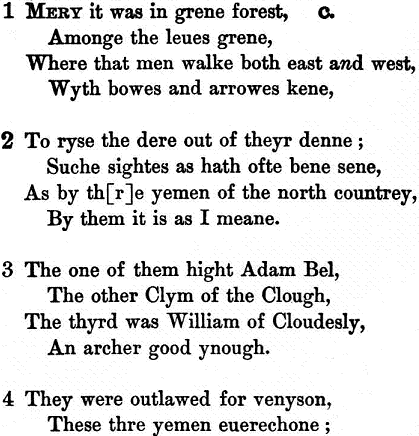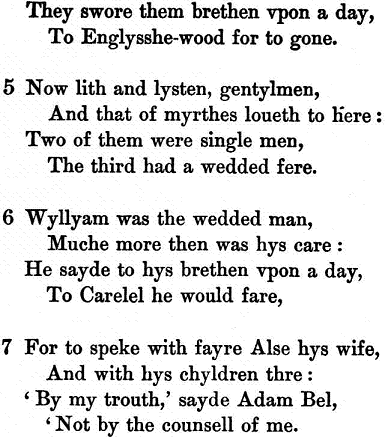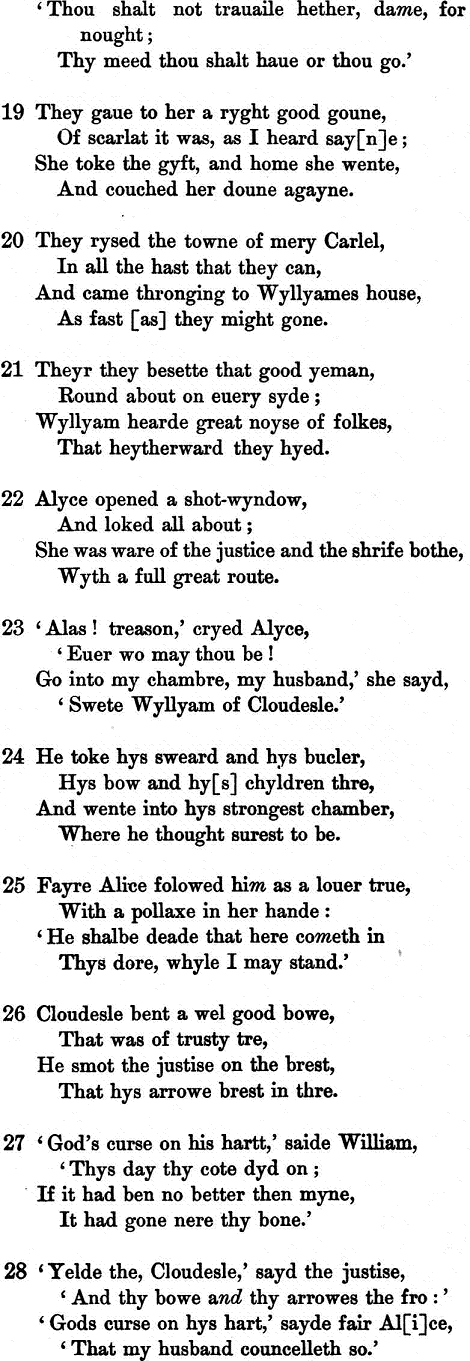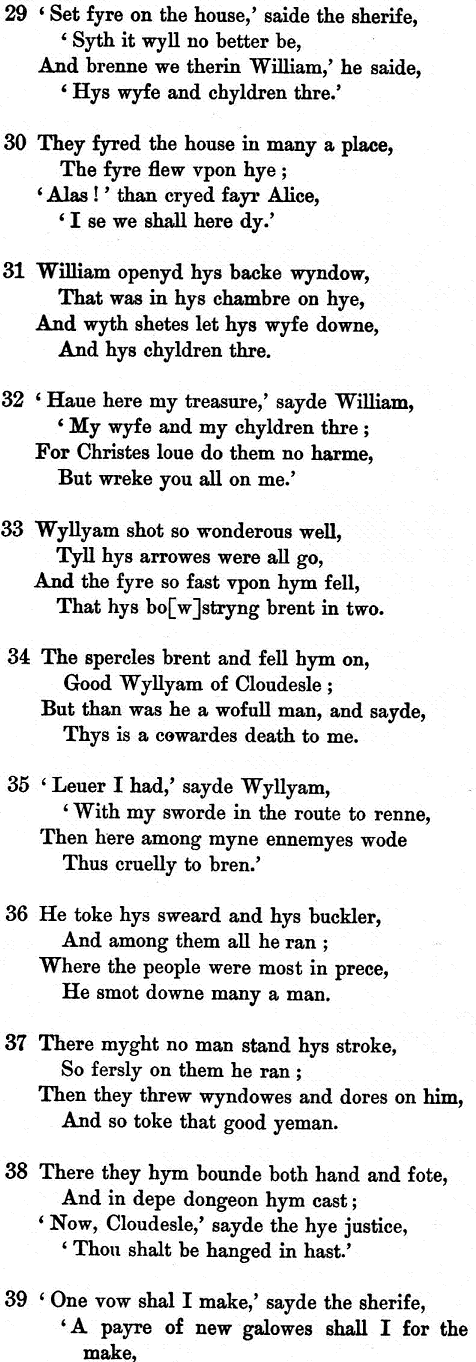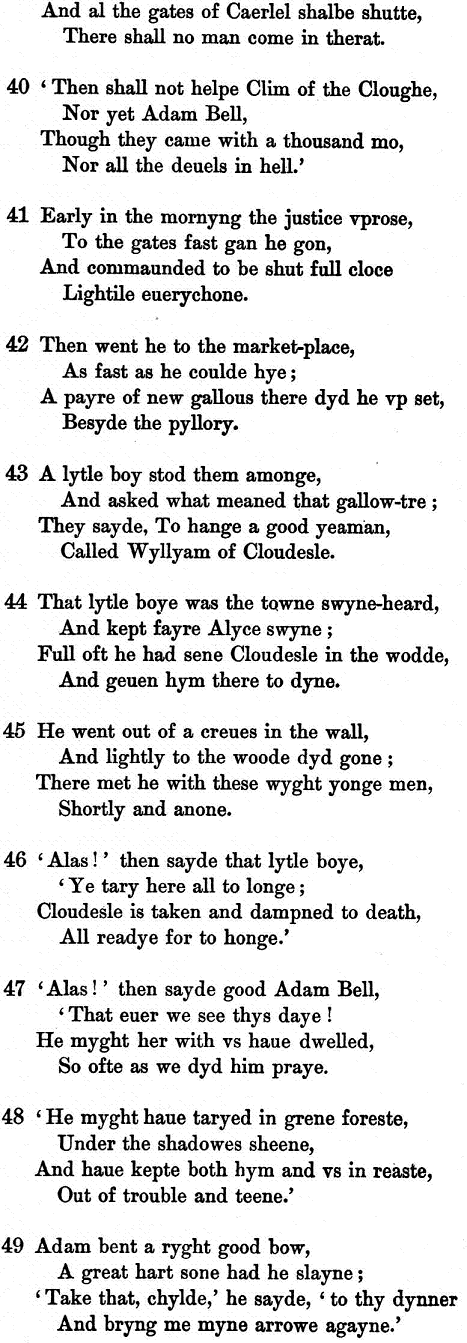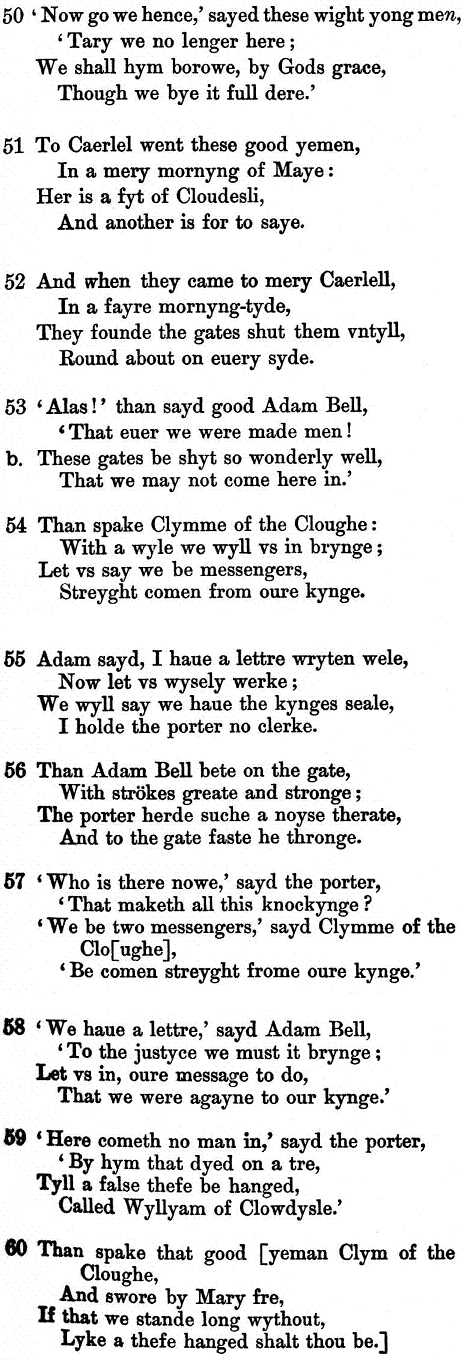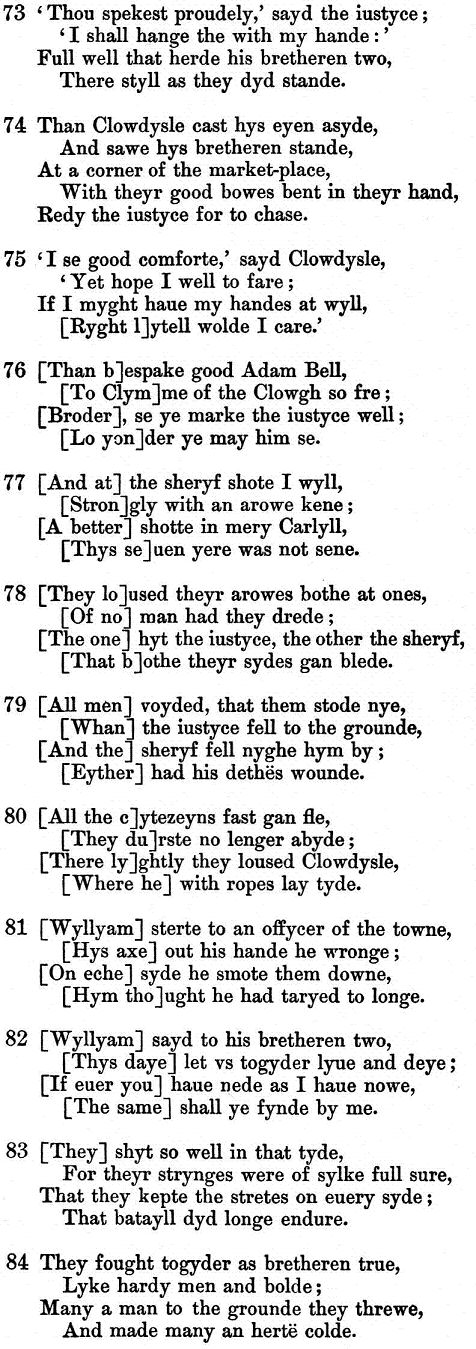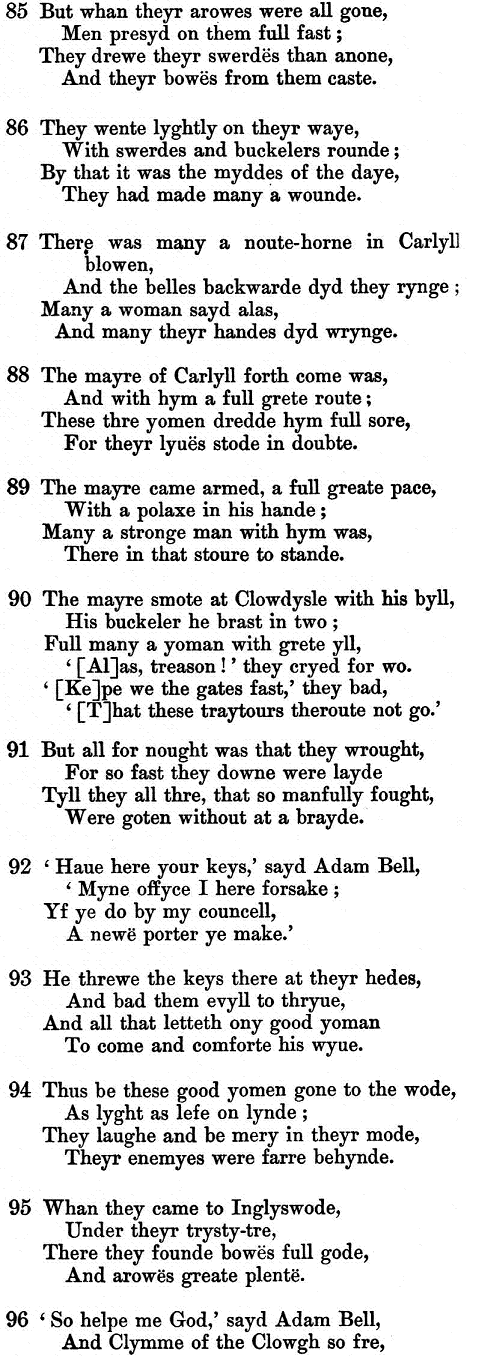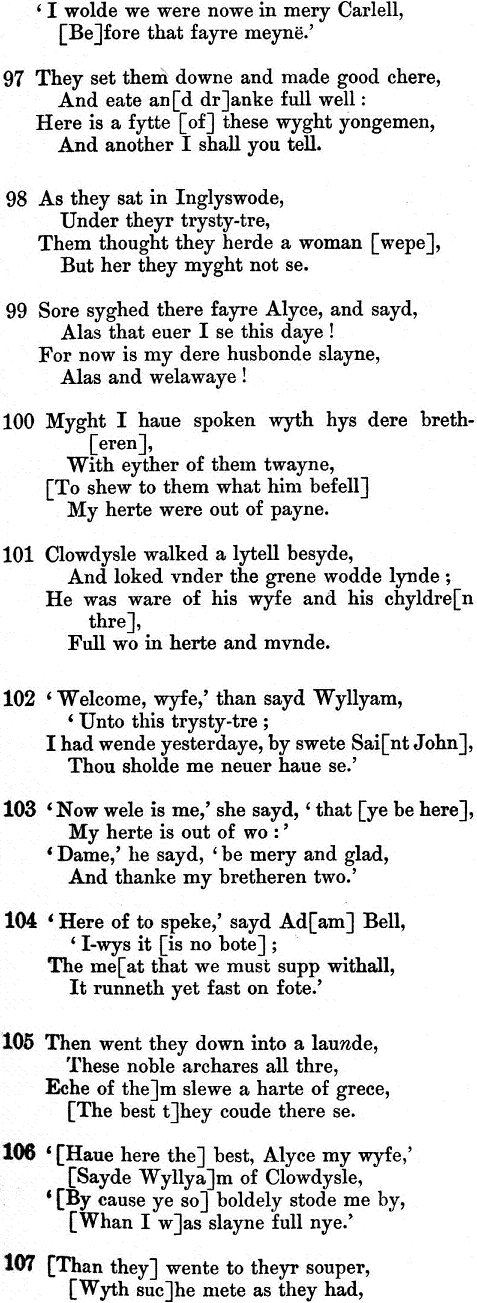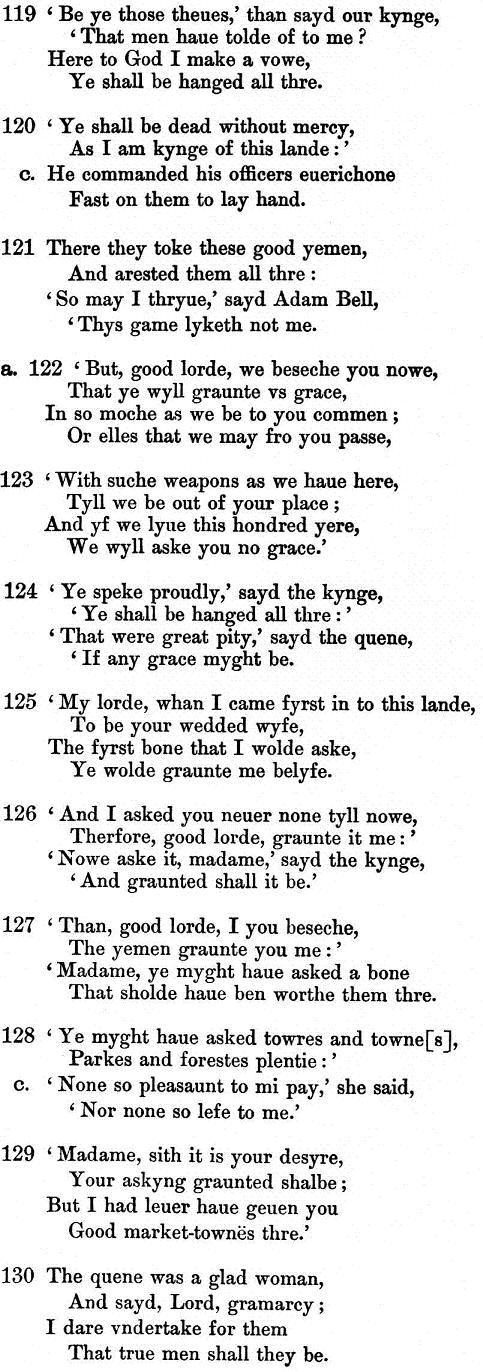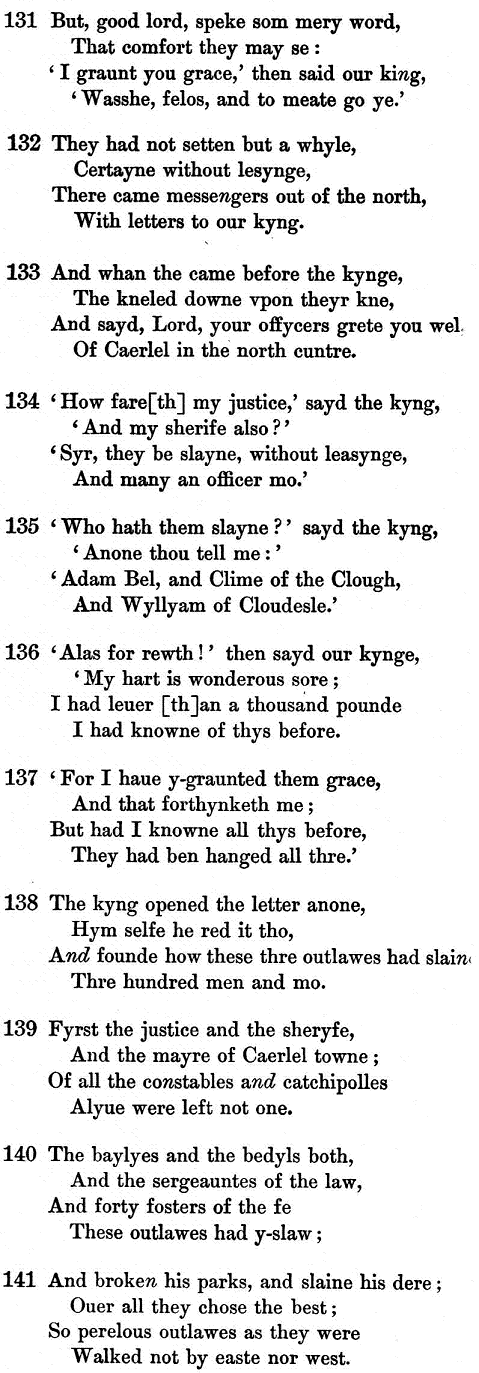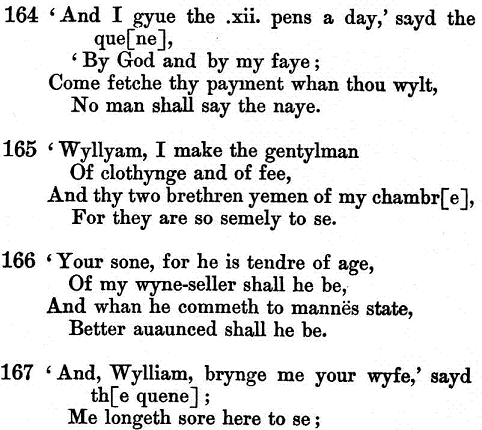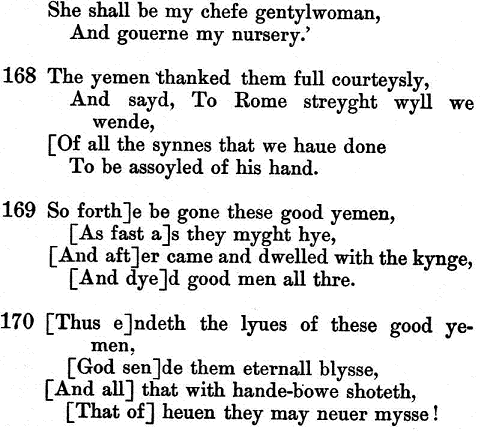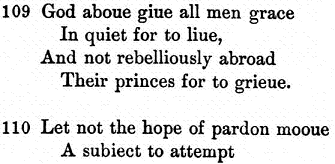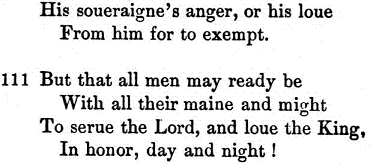Adam Bell, Clim of the Clough, and William of Cloudesly
Apart from Robin Hood and his men there are three other famous ‘Yemen of the north countrey’, the three Inglewood outlaws known as Adam Bell, Clim of the Clough, and William of Cloudesly. The hero of the three is actually William of Cloudesly, who is captured in Carlisle in the first fytte, rescued by Adam and Clim in the second, and successful in shooting an apple off his son’s head in the third. Despite this the ballad has usually been given the short title of Adam Bell, since it’s first entry on the Stationers Register in 1557-58.(1) Early sixteenth century printed fragments of the tale prove that it existed in the reign of Henry VIII,(2) however the earliest surviving complete edition is that printed by William Copland in c.1560.(3) The number of early editions suggest that Adam Bell was quite popular from the sixteenth century onwards, it was reprinted at least seven times in the course of the seventeenth century.(4) Indirect reference to the poem appears in Shakespeare’s Much Ado About Nothing (Act. I, Scene I : ‘and he that hits me, let him be clapped on the shoulder, and called Adam’); Ben Jonson’s The Alchemist (Act I : ‘No cheating Clim o’ the Cloughs’); and William Davenant’s The Long Vacation in London. Robert Laneham gives us a description of the court festivities at Kenilworth in 1575 which reveal that the famous collector of ‘ballets and songs’, Captain Cox of Coventry, was familiar with the ‘stories’ of both Adam Bell and Robin Hood.(5) One attempt to link the careers of the two most famous groups of outlaws in England can be found in the ballad Robin Hood’s Birth, Breeding, Valor and Marriage, (see The Rhymes of Robin Hood) this occurs in the third and fourth stanzas where the Pinder of Wakefield is alleged to have arranged an archery contest between Robin Hood’s father and ‘Adam Bell, and Clim of the Clugh, and William a Cloudelle’. Despite the fact that in survives in texts of the sixteenth century, Adam Bell is undoubtedly of medieval origin and possibly emerged at about the same period as the earliest surviving tales of Robin Hood. Like the Gest, Robin Hood and the Monk, and Robin Hood and the Potter, it was probably designed to be read aloud and it has many characteristic features of the late medieval metrical romance: the seasonal incipit, the division of a long work into fyttes, the minstrel’s direct address to his listeners (especially stanzas 5, 51, 97, 170), the remnants of alliterative poetic diction and the frequent use of an ABAB rhyming pattern within the stanzas.(6)
If we accept Adam Bell as a work of ‘Yeoman minstrelsy’ we can invariably make comparisons with the early Robin Hood ballads. The rescue of William Cloudesly by Adam Bell and Clim of the Clough has a close resemblance to Little John’s and Much’s deliverance of Robin Hood in stanzas 61-82 of Robin Hood and the Monk. Like Robin in the Gest, Adam Bell and his colleagues receive a pardon from the king and a place in the household. Even in the Tale of Gamelyn we find that Gamelyn is made justice of all the free forests, as William of Cloudesly is made chief rider over all the North Country. There can be no doubt that Adam Bell has its own distinctive features, such as its location in Inglewood(7) and the episode of an archer (William of Cloudesly) shooting an apple placed on his son’s head. As Child has pointed out, (III, p.16) ‘The shooting of an apple from a boy’s head, sts 151-62, is, as is well known, a trait in several German and Norse traditions, and these particular feats, as well as everything resembling them, have been a subject of eager discussion in connection with the apocryphal history of William Tell.’(8) It is obvious that the compiler of Adam Bell, was simply adapting one of the most popular stories of north European literature, for his own use.
Joseph Hunter attempted to identify Adam Bell as ‘a genuine personage of history’, and he mentioned that he had ‘the good fortune to recover from a very authentic source of information some particulars of this hero of our popular minstrelsy which show distinctly the time at which he lived.’
Hunter continues with the following:
King Henry the Fourth, by letters enrolled in the Exchequer, in Trinity Term, in the seventh year of his reign [1406], and bearing date the 14th day of April, granted to one Adam Bell an annuity of 4l. 10s. issuing out of the fee-farm of Clipston, in the forest of Sherwood, together with the profits and advantages of the vesture and herbage of the garden called the Halgarth, in which the manor-house of Clipston is situated. Now, as Sherwood is noted for its connection with archery, and may be regarded also as the patria of much of the ballad poetry of England, and the name of Adam Bell is a peculiar one, this might be almost of itself sufficient to show that the ballad had a foundation in veritable history. But we further find that this Adam Bell violated his allegiance by adhering to the Scots, the king’s, enemies; whereupon this grant was virtually resumed, and the sheriff of Nottinghamshire accounted for the rents which would have been his. In the third year of King Henry the Fifth [1416], the account was rendered by Thomas Hercy, and in the fourth year by Simon Leak. The mention of his adhesion to the Scots leads us to the Scottish border, and will not leave a doubt in the mind of the most sceptical that we have here one of the persons, some of whose deeds (with some poetical license, perhaps) are come down to us in the words of one of our popular ballads. (New Illustrations of the Life, Studies, and Writings of Shakespeare, I, 245 f, 1845).
Child found Hunter’s identification of Adam Bell to be unconvincing:
Mr Hunter’s points are, that an Adam Bell had a grant from the proceeds of a farm in the forest of Sherwood, that Adam Bell is a peculiar name, and that his Adam Bell adhered to the king’s enemies. To be sure, Adam Bell’s retreat in tbe ballad is not Sherwood, in Nottinghamshire, but Englishwood, or Inglewood, in Cumberland (an old hunting ground of King Arthur’s, according to several romances), a forest sixteen miles in length, reaching from Carlisle to Penrith. But it would be captious to insist upon this. Robin Hood has no connection in extant ballads with the Cumberland forest, but Wyntoun’s Scottish Chronicle, c. 1420, makes him to have frequented Inglewood as well as Barnsdale. The historical Adam Bell was granted an annuity, and forfeited it for adhering to the king’s enemies, the Scots ; the Adam Bell of the ballad was outlawed for breaking the game-laws, and in consequence came into conflict with the king’s officers, but never adhered to the king’s enemies, first or last, received the king’s pardon, was made yeoman of the queen’s chamber, dwelt with the king, and died a good man. Neither is there anything peculiar in the name Adam Bell. Bell was as well known a name on the borders as Armstrong or Graham. There is record of an Adam Armstrong and an Adam Graham; there is a Yorkshire Adam Bell mentioned in the Parliamentary Writs (II, 508, 8 and I7 Edward II,) a hundred years before Hunter’s annuitant; a contemporary Adam Bell of Dunbar, is named in the Exchequer Roll of Scotland under the years 1414, ……. (IV, 198, 325); and the name occurs repeatedly at a later date in the Registers of the Great Seal of Scotland. (Child, III, pp. 21-22).
John Bell robbed the Chamberlain’s men of cattle, 1337: Exchequer Rolls of Scotland, II, 437. The Bells are included with the Grahams, Armstrongs, and others, among the bad and more vagrant of the great surnames of the border, by the Lord Warden of the Marches of England, 1593 (Rymer’s Foedera, XVI, 183, ed. 1727, cited by Bishop Percy), and had no better estimation in Scotland. (Child, III, notes, p. 22)
1. ‘Adam Bell’ was licensed to John Kynge in the Stationers Registers, 19 July, 1557 and 9 July, 1558. Again, among copies which were Sampson Awdeley’s, to John Charlewood, 15 January, 1582; and, among copies which were John Charlwoode’s, to James Robertes, 31 May, 1594.
2. Two fragments, stanzas 113-128, 161-170 of an edition by John Byddell, London, 1536, (Cambridge University Library, Sym. 7. 50. 9). A fragment of an early sixteenth century edition, by an unidentified printer, once in the possession of J. Payne Collier. This fragment preserves stanzas 53-111.
3. Several lines in Copland’s edition have been cut away or omitted, these omissions have been supplied from other early editions. (see below)
4. Child, III, p. 14.
5. Robert Laneham’s Letter to Humfrey Martin, ed. F. J. Furnivall, as Captain Cox, His Ballads and Books (Ballad Society, 1871), pp. 1i-1iv.
6. Cf. Fowler, Literary History of Popular Ballad, p. 71.
7. Inglewood, a Cumberland forest stretching from Penrith to Carlisle and famous for its hunting; it was also used as the scene for several of King Arthur’s legendary adventures. This could explain the reason why the Scottish chronicler, Andrew of Wyntoun, placed Robin Hood in ‘Ingilwode’ as well as ‘Bernysdale’.
8. A discussion of this theme is provided by Child, (III, pp. 16-21) with a brief summary of tales such as: The Icelandic saga of Dietrich of Bern, c. 1250, The writings of Saxo, c. 1200, and The White Book of Obwalden, c. 1470.
The tale of Adam, Clim, and William, begins with the three being outlawed for breaking the game-laws, they swear brotherhood, then go to Inglewood, a forest near Carlisle. William is married, and one day he tells his brethren that he wishes to go to Carlisle to see his wife and children. Adam does not recommend this, as he fears William will be taken by the justice. William goes to Carlisle, nevertheless, knocks at the window of his house, and is admitted by Alice, his wife. She tells him that the place has been beset for him for half a year and more. As they make good cheer, and old woman, that William had kept seven years for charity, sneaks out and tells the justice and the sheriff that William is in town. They reward the old woman with a gown of scarlett and she returns home. The justice and the sheriff gather a great crowd from Carlisle, and they throng to William’s house. Man and wife defend the house until it is set on fire. William lets his wife and children down with sheets, and shoots until his bowstring is burnt, then runs towards his enemies with sword and buckler, but is taken down by doors and windows thrown on him. He is bound hand and foot and cast into a deep dungeon.The sheriff orders the gates of Carlisle to be shut, and he sets up a gallows to hang William. A boy, known to the family, manages to sneak out a crevice in the wall, and he inform Adam and Clim, who immediately set out for the rescue. They find the gates shut fast, but Adam has a fair written letter in his pocket; they will fool the porter into thinking they have the king’s seal. They beat on the gate until the porter comes, and demand to be let in as messengers from the king to the justice. The porter is hesitant, but they intimidate him with the king’s seal; he opens the gate; they wring his neck and take the keys. First they prepare their bows, then they head for the market-place, where they see William lying in a cart, ready to be hanged. William sees them and takes hope. Adam shoots the sheriff, Clim the justice; both fall mortally wounded; the citizens flee; the outlaws loosen Williams ropes, he then grabs an axe from an officer and proceeds to slash on every side. Adam and Clim shoot until their arrows are gone, then draw their swords. Horns are blown, and the bells rang backwards; the mayor of Carlisle comes with a large force, but the outlaws get to the gates, and are soon in Inglewood, under their trysty-tree.
Alice had come to Inglewood to inform Adam and Clim of her husband’s fate, but naturally had not found them, since they had already gone to William’s rescue. The outlaw’s hear a woman weeping, and upon taking a look, William comes upon his wife and three children. The sight of her husband makes Alice happy, and all is well. Three deer are killed for supper, and William gives Alice the best for standing by him. William decides that they should go to the king to get a charter of peace. He takes his eldest son with him, leaving Alice and the two younger brothers at a nunnery. The outlaws head to London and eventually arrive at the palace gates; they proceed into the hall, bypass the porter and usher, and make their way to the king’s presence. They kneel down, raise their hands, then proceed to ask the king’s grace for having slain his deer. The king asks their names, and when he hears who they are, he declares they shall all be hanged, and orders them to be arrested. Adam again asks grace, since they have come to the king of their own free will, or else that they may go, with such weapons as they have, when they will ask no grace in a hundred years. The king replies that all three shall be hanged. Upon hearing this, the queen reminds the king that when she was wedded he had promised to grant the first boon that she should ask; she had until now asked nothing, but now begs the three yeoman’s lives. Her wish is granted with some hesitation, but soon after there appears messengers from the North Country with letters for the king. He is informed that the outlaws had slain the justice and the sheriff, the mayor of Carlisle, all the constables and catchpolls, the sergeants of the law, forty foresters, and many more. This makes the king so sad he can eat no more, but he calls his best archers to go with him to the butts, for he wishes to see these fellows shoot that have brought him so much woe. Both the king’s and the queen’s archers go to the butts with the three yeoman, and the outlaws hit everything that is set up. William holds the butts too wide for a good archer, and the three set up two hazel rods, twenty paces apart; he is a good archer says William, that cleaves one of these. The king says no man can do it, but William cleaves the wand. The king declares him the best archer he ever saw. William says he will do more mastery: he will lay an apple on his son’s head (a boy of seven) and split it in two at six score paces. The king bids William make haste for to do: if he fails he shall be hanged, and if he even touches his son’s head or gown, all three shall be hanged. William ties the child to a stake, turns his head from him, sets an apple on his head, and after begging the spectators to remain quiet, cleaves the apple in two. The king gives William eighteen pence a day as his bowman, and make him chief rider over the North country. The queen adds twelve pence and makes him a gentleman of cloth and fee, and makes his two brothers yeoman of her chamber. She also gives the boy a place in her wine-cellar, and appoints Alice her chief gentlewoman and governess of her nursery. The yeoman give their thanks, go to Rome (to some bishop, in the later copy) to be absolved of their sins, and live the rest of their lives with the king, and die good men, all three.
I have reproduced the two versions from Child, and as he has pointed out:
The larger part of a has been reprinted by Mr F. S. Ellis, in his catalogue of the library of Mr Henry Huth, I, 128f, 1880; b was used by Mr W.C. Hazlitt for his edition of the ballad in Remains of the Early Popular Poetry of England, II, 131; c was reprinted by Percy in his Reliques, 1765, I, 129, with corrections from f; and by Ritson, Pieces of Ancient Popular Poetry, 1791, p. 5, with the necessary emendations of Copland’s somewhat faulty text; d is followed by a Second Part, described by Ritson, in temperate terms, as ‘a very inferior and servile production.’
Source: (a) Two fragments stanzas 113-128, 161-170, of an edition by John Byddell, London, 1536 (Cambridge University Library, Sym. 7. 50. 9); (b) A Fragment of an early sixteenth century edition, by an unidentified printer, once in the possession of J. Payne Collier. This fragment preserves stanzas 53-111; (c) ‘Adambel, Clym of the cloughe, and Wyllyam of cloudesle’. ‘Imprinted at London in Lothburye by Wyllyam Copeland’ (1548-68). (British Library copy, press-mark C. 21. c. 64); (d) ‘Adam Bell, Clim of the Clough, and William of Cloudesle,’ James Roberts, London, 1605 (Bodleian Library, C. 39, Art. Selden; (e) Another edition with the same title-page (Bodleian Library, Malone, 299; (f) ‘Adam Bell, Clime of the Cloug(he), and William off Cloudeslee,’ Percy MS., p. 390 (British Museum).
Editions: Percy’s Reliques of Ancient English Poetry (included in the 1765 and all later editions); Ritson, Pieces of Ancient Popular Poetry, 1791, pp. 5-30; Gutch, 1847, II, 320-43; Bishop Percy’s Folio Manuscript, ed. Hales and Furnivall, III, 76-101; Child, 1888, III, 22-30; Quiller-Couch, 1910, pp. 468-96; Oxford Book of Ballads, 1969, pp. 380-404; Dobson and Taylor Rymes of Robyn Hood, 1976, pp. 260-273.
Adam Bell, Clim of the Clough, and William of Cloudesly (Child 116)

|
